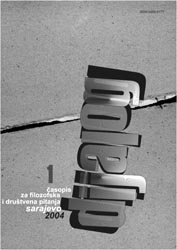PITANJE O NACIONALNOM IDENTITETU BOŠNJAKA U HISTORIJSKOJ PERSPEKTIVI I U KONTEKSTU NJIHOVOG POVIJESNO-KULTURNOG IDENTITETA
BOSNIAC NATIONAL IDENTITY
Author(s): Muhamed FilipovićSubject(s): Philosophy
Published by: Akademija Nauka i Umjetnosti Bosne i Hercegovine
Summary/Abstract: The paper sets out the nature of Bosnian identity and draws attention to its two facets: on the one hand, the fact that in the entire history of Bosnia, its originality, and the nature of Bosnian society, national identity never evolved as the dominant social, cultural and political process as it typically did in Europe from the 16th to the 20th century. Whereas nation-states and homogeneous national societies evolved in Europe, a process associated with the evolution of civil society and capitalism, the national market, state and language, in Bosnia multilateral society persisted, with a neutral stance towards the religious, ethnic and cultural differences of its population, but also with the very pronounced shared supranational features specific, spiritually and culturally, to a given society, in which different models of culture and spirituality strikingly intermingled and influenced one another. In Bosnia, no national market in goods and labour ever evolved, nor was there feudalism of the European type, where the peasants were tied to the land; neither did a national language evolve and a single national script come to dominate. There was no state corresponding to the national territory and able to ensure within it the use of a single language, a single protected market and so forth. The fundamental identity of the Bosnian was the multifaceted, universal identity characteristic of every society in which there was no determinant idea of nation and the nation-state and which did not see the emergence of intolerance towards others as something that was an obstacle to national constitution and evolution, as was so typical of western history. When, alongside the waning of Ottoman power and the growing strength of its neighbouring states as they emancipated themselves from Ottoman rule, the idea of national identity began to make inroads or to be systematically introduced into Bosnian society, which could only be done in Bosnia by nationalizing the religious differences among the population, a dual process came about. On the one hand, there was the creation of nations that had their constituent centre outside Bosnia and which evolved their national, cultural and political agenda by adopting ready-made ideas and models that were foreign to Bosnia, but this was also accompanied by efforts to maintain the original multilateral Bosnian culture and way of life. Naturally enough, this tore Bosnia apart internally and gave rise to all kinds of internal tensions. The prevalence of the model of national history resulted, as has been evident ever since the end of the 19th century, in divisions leading to the destruction not only of the original Bosnian way of life but also to political divisions, culminating in several attempts to create national states within Bosnia or even to the unilateral nationalization of Bosnia and Herzegovina as a whole. It is this that generated the bloodstained history of Bosnia in the 20th century. In this context, the author refl
Journal: Dijalog - Časopis za filozofiju i društvenu teoriju
- Issue Year: 2004
- Issue No: 01
- Page Range: 95-140
- Page Count: 46
- Language: Bosnian

